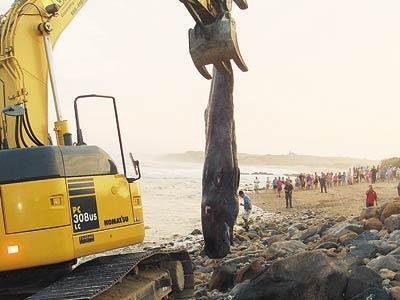Trustees Plan Protocol For Stranded Whales

“Whale Off!” a cry that echoed here until the early 1900s, called shore whalers to the ocean beach from which they would row out dories to harvest passing whales much as Native Americans had done in days of yore.
The whole community benefited in some way, sharing some of the proceeds of the sale of whale oil and baleen. These days, however, what townspeople get to share is the cost of dealing with a whale that has drifted ashore — dead or alive.
When a whale washed up on Napeague in January, the East Hampton Town Board slapped the town trustees with a $7,500 bill for having it cut up and taken away, a cost that had hitherto been accepted by the board as a townwide expense. To come to grips with this, and strandings in the future, the trustees have embarked on a policy and a fund to pay for whatever gets done. Deborah Klughers, a trustee who has a master’s degree in marine conservation policy, has been doing the research.
Ms. Klughers said the authority to deal with strandings, except in Montauk, became the trustees’ alone when Town Supervisor Bill Wilkinson decided unilaterally to hand them the bill. But the issues are complex and, she said, authority should be shared.
Since 1972, whales have been protected by the federal Marine Mammals Protection Act. The law prevents the taking of whale parts. In addition, if a whale is alive when it comes ashore, the decision to try to save or end its life must be made in cooperation with the National Oceanic and Atmospheric Administration, the agency coincidentally known as NOAA. If a whale is euthanized using chemicals, it cannot be buried or towed offshore and must be incinerated.
The Riverhead Foundation, the nonprofit organization affiliated with the Long Island Aquarium and Exhibition Center, operates an Island-wide stranding network. Ms. Klughers said the foundation’s research, much of it gleaned from necropsies when whales are on the beach, had to be viewed in the context of public health and safety, especially when a dead whale washes up on a 90-degree day in the middle of the tourist season.
The depth of the foundation’s participation also had to be weighed against the efficacy and cost of disposing of the animal, she said, noting that the foundation recently lost a good deal of its federal funding
Ms. Klughers said the plan would would seek to make it clear that, except for situations related to federal authority, what happened to beached whales would be local government’s call requiring cooperation between the trustees and the town board in the same way that the distinct bodies now cooperate on shellfish regulations. The stranding fund might come, she said, by a voluntary contribution on town property tax forms.
“In our situation, two bodies should co-manage, should decide together.” She said her goal was to make a well-researched argument for doing just that.
“If it’s on private property, it’s your problem under federal law. You’re going to pay for it. Is it unfair? Maybe, but it’s unfair when the public doesn’t have access to private beach.” Would the town and/or trustees come to the rescue? The question should be debated, Ms. Klughers said. She noted that the trustees own, on behalf of the public, most of the beaches in town, except for those in Montauk.
Designating local government as in charge, the plan would help relieve the Riverhead Foundation of financial responsibility as well as criticism in how it handles stranded whales. Ms. Klughers said a town stranding fund could be used to help the foundation, or another scientific entity, but “we don’t have to let scientists cut it up. The foundation is under a microscope,” she said. She referred to criticisms flung at the organization over the long-delayed and bungled euthanizing of a humpback whale that washed up at Main Beach in East Hampton in 2010. “Some people think the foundation can reincarnate a whale.”
Ms. Klughers said she hoped to write a comprehensive plan that would start with a history of human and whale interaction in these parts. It will explain the federal protection act, she said, and the risks or advantages and costs of different ways of disposing of dead whales, including having them towed back to sea.
The plan will list people and organizations that must be contacted when a whale comes ashore, including contractors with heavy equipment and representatives of the area’s indigenous people.
As for the stranding fund, Ms. Klughers said it could go toward helping the Riverhead Foundation, the cost of helping stricken animals, or the cost of disposing of dead ones. She said she had already been in contact with the Shinnecocks to inform the tribe of the trustees’ desire to see their traditions endure.
